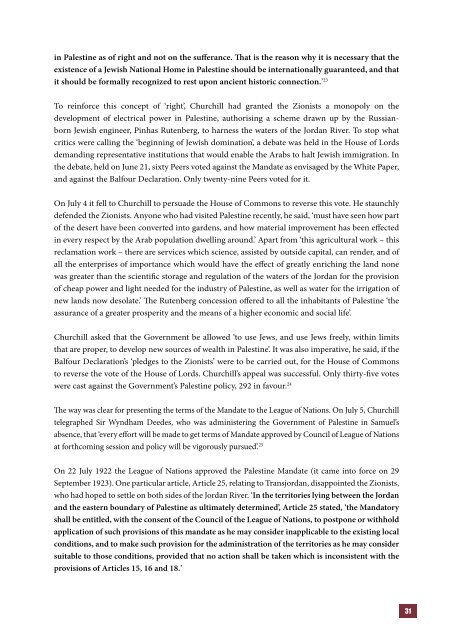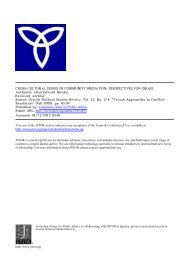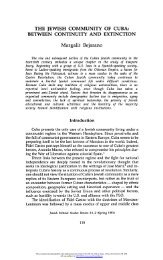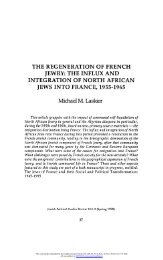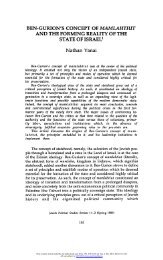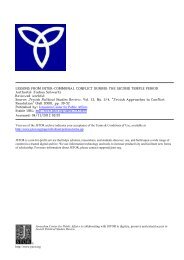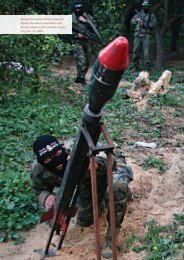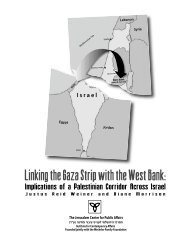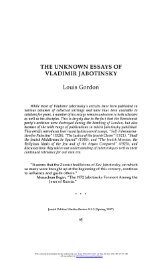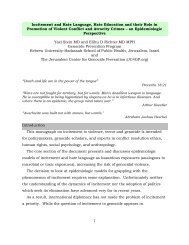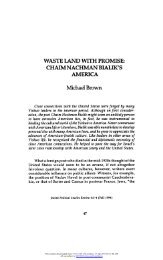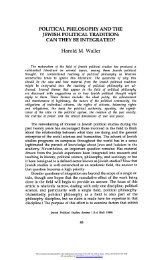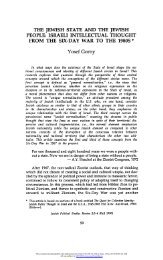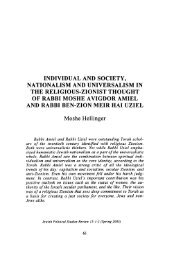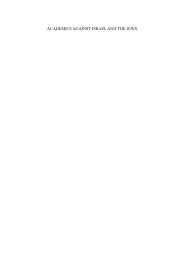Download the PDF here - Jerusalem Center For Public Affairs
Download the PDF here - Jerusalem Center For Public Affairs
Download the PDF here - Jerusalem Center For Public Affairs
- No tags were found...
Create successful ePaper yourself
Turn your PDF publications into a flip-book with our unique Google optimized e-Paper software.
in Palestine as of right and not on <strong>the</strong> sufferance. That is <strong>the</strong> reason why it is necessary that <strong>the</strong>existence of a Jewish National Home in Palestine should be internationally guaranteed, and thatit should be formally recognized to rest upon ancient historic connection.’ 23To reinforce this concept of ‘right’, Churchill had granted <strong>the</strong> Zionists a monopoly on <strong>the</strong>development of electrical power in Palestine, authorising a scheme drawn up by <strong>the</strong> RussianbornJewish engineer, Pinhas Rutenberg, to harness <strong>the</strong> waters of <strong>the</strong> Jordan River. To stop whatcritics were calling <strong>the</strong> ‘beginning of Jewish domination’, a debate was held in <strong>the</strong> House of Lordsdemanding representative institutions that would enable <strong>the</strong> Arabs to halt Jewish immigration. In<strong>the</strong> debate, held on June 21, sixty Peers voted against <strong>the</strong> Mandate as envisaged by <strong>the</strong> White Paper,and against <strong>the</strong> Balfour Declaration. Only twenty-nine Peers voted for it.On July 4 it fell to Churchill to persuade <strong>the</strong> House of Commons to reverse this vote. He staunchlydefended <strong>the</strong> Zionists. Anyone who had visited Palestine recently, he said, ‘must have seen how partof <strong>the</strong> desert have been converted into gardens, and how material improvement has been effectedin every respect by <strong>the</strong> Arab population dwelling around.’ Apart from ‘this agricultural work – thisreclamation work – <strong>the</strong>re are services which science, assisted by outside capital, can render, and ofall <strong>the</strong> enterprises of importance which would have <strong>the</strong> effect of greatly enriching <strong>the</strong> land nonewas greater than <strong>the</strong> scientific storage and regulation of <strong>the</strong> waters of <strong>the</strong> Jordan for <strong>the</strong> provisionof cheap power and light needed for <strong>the</strong> industry of Palestine, as well as water for <strong>the</strong> irrigation ofnew lands now desolate.’ The Rutenberg concession offered to all <strong>the</strong> inhabitants of Palestine ‘<strong>the</strong>assurance of a greater prosperity and <strong>the</strong> means of a higher economic and social life’.Churchill asked that <strong>the</strong> Government be allowed ‘to use Jews, and use Jews freely, within limitsthat are proper, to develop new sources of wealth in Palestine’. It was also imperative, he said, if <strong>the</strong>Balfour Declaration’s ‘pledges to <strong>the</strong> Zionists’ were to be carried out, for <strong>the</strong> House of Commonsto reverse <strong>the</strong> vote of <strong>the</strong> House of Lords. Churchill’s appeal was successful. Only thirty-five voteswere cast against <strong>the</strong> Government’s Palestine policy, 292 in favour. 24The way was clear for presenting <strong>the</strong> terms of <strong>the</strong> Mandate to <strong>the</strong> League of Nations. On July 5, Churchilltelegraphed Sir Wyndham Deedes, who was administering <strong>the</strong> Government of Palestine in Samuel’sabsence, that ‘every effort will be made to get terms of Mandate approved by Council of League of Nationsat forthcoming session and policy will be vigorously pursued’. 25On 22 July 1922 <strong>the</strong> League of Nations approved <strong>the</strong> Palestine Mandate (it came into force on 29September 1923). One particular article, Article 25, relating to Transjordan, disappointed <strong>the</strong> Zionists,who had hoped to settle on both sides of <strong>the</strong> Jordan River. ‘In <strong>the</strong> territories lying between <strong>the</strong> Jordanand <strong>the</strong> eastern boundary of Palestine as ultimately determined’, Article 25 stated, ‘<strong>the</strong> Mandatoryshall be entitled, with <strong>the</strong> consent of <strong>the</strong> Council of <strong>the</strong> League of Nations, to postpone or withholdapplication of such provisions of this mandate as he may consider inapplicable to <strong>the</strong> existing localconditions, and to make such provision for <strong>the</strong> administration of <strong>the</strong> territories as he may considersuitable to those conditions, provided that no action shall be taken which is inconsistent with <strong>the</strong>provisions of Articles 15, 16 and 18.’31


